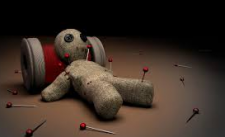In the end, it was a complete waste of time and money. Yet, the National Health and Medical Research Council (NHMRC), Australia's top agency for medical research has concluded that night is darker than day, but not before examining 225 studies that had already proven this.
the end, it was a complete waste of time and money. Yet, the National Health and Medical Research Council (NHMRC), Australia's top agency for medical research has concluded that night is darker than day, but not before examining 225 studies that had already proven this.
If that sounds stupid, it is. Just as much so as studying the actual topic of the research homeopathy.
Homeopathy is a remnant from the 19th century. It arose as an alternative to drugs of the day, which were toxic and mostly useless, and was based on a fundamental flaw in chemistry and biology that when a solution of God-knows-what is diluted to the point where none of it is left, it will still have a biological or medicinal effect.
Still is really not an appropriate term, since God-knows-what almost certainly did nothing even before it was diluted. This led ACSH s Dr. Josh Bloom to wonder if perhaps homeopaths practice a different version of the Hippocratic Oath First, do no harm. Second, do no good.
So, how is it possible for something that was present to still have a biological effect after it is gone? Well, its not, but that didn t stop believers from coming up with an explanation that managed to violate pretty much every rule of chemistry. Homeopathy works, according to its adherents, by altering the structure and function of the water that remains once the God-knows-what is gone.
Dr. Bloom comments, Too bad this doesn t work in my kitchen. Then, after I finished an entire box of Entenmann s chocolate donuts, I could go back to the same cabinet and they d still be there.
We are not even going to bother to discuss the findings of NHMRC. It s a waste of electrons. Rather, we would like to point out both the harm and harmlessness and danger of homeopathic voodoo (we don't have strong enough stomachs to call it medicine).
The good news is that a homeopathic remedy cannot directly harm you, unless you drown in it. But there is also a real downside to this.
Dr. Bloom explains When people drink water instead of getting real medical treatment, they are putting themselves at risk indirectly. The same concept cost Steve Jobs his life. Jobs tried alternative medicine at a time where his rare form of pancreatic cancer was curable. Of course, it didn t work, and by the time he realized this, it was too late the cancer had spread.
He concludes, It is nothing short of pathetic that any money or time is spent disproving something that is patently ridiculous. I don t need to study whether a bowling ball dropped from the top of the Empire State Building will hurt when it lands on my head.


